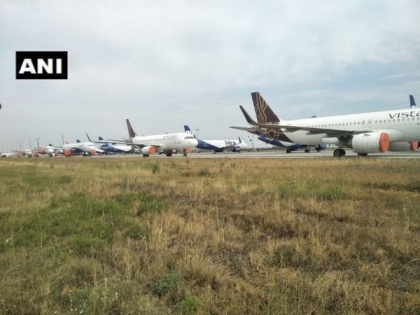AAPA calls for collaboration between governments for aviation recovery
By ANI | Published: July 24, 2020 02:05 PM2020-07-24T14:05:57+5:302020-07-24T14:20:07+5:30
The Association of Asia Pacific Airlines (AAPA) has urged governments to ease what it calls are unduly onerous restrictions on international air travel to re-establish global connectivity with evidence-based measures to safeguard public health.

AAPA calls for collaboration between governments for aviation recovery
The Association of Asia Pacific Airlines (AAPA) has urged governments to ease what it calls are unduly onerous restrictions on international air travel to re-establish global connectivity with evidence-based measures to safeguard public health.More than six months into the COVID-19 pandemic, the Asia Pacific air transport industry is taking initial steps towards restarting international operations by working closely with governments, health authorities and other stakeholders.
However, most international flights worldwide continue to be grounded by border closures and other travel restrictions even as domestic lockdowns are gradually eased. AAPA said the economic consequences of such shutdowns are far-reaching with the travel and tourism sectors among the hardest hit.
Airline failures and major job losses have been announced within the industry and could become more widespread as the crisis becomes prolonged.
AAPA said hopes that international air travel will gradually return in the second half of 2020 now seem premature as governments direct attention and resources to fight resurgent domestic infections.Welcomed by industry, the publication of guidance material in June by the Council Aviation Recovery Taskforce (CART) of the International Civil Aviation Orgsation (ICAO) to anchor coordinated efforts to restart international air travel was a significant step in the right direction.
However, progress has been slow and sporadic on this front. While there have been initiatives and discussions about opening up international air corridors, travel bubbles, green lanes or fast channels, such initiatives have so far failed to take off due to their impractical requirements and inherent unscalability to meet the reasonable expectations of the travelling public.
AAPA said good progress is being made on widespread testing and contact tracing, wearing of masks and social distancing, which are now progressively being implemented by governments across the world. Such measures are also being applied in the context of international air travel.
But these need to be consistent, based on robust risk assessments and coordinated among governments working closely together with airlines, airports and health authorities.Public attitudes towards air travel are evolving as confidence is rebuilt. However, a major obstacle is the widespread imposition of blanket quarantine measures by governments on inbound passengers.
This makes any attempt to travel internationally by air extremely daunting, with questionable benefits over the need for quarantines once adequate community testing and contact tracing measures are in place.
Furthermore, the unpredictability and changing requirements of such measures only add to the confusion for both airlines and passengers.
"International isolation is not a sustainable long-term solution for any government given the importance of travel and trade in supporting a global economic and social activity," said AAPA Director General Subhas Menon.
"We must take a pragmatic approach to restarting flights gradually while mitigating risks to restore confidence and trust in the reliability of everyday air travel," he said in a statement.Menon said quarantine measures should only be applied selectively for passengers originating from higher-risk locations.
"Another critical area for cooperation is reaching a common understanding on the use of Covid-19 testing as a further risk mitigation measure in screening international passengers based on mutual acceptance."
( With inputs from ANI )
Open in app